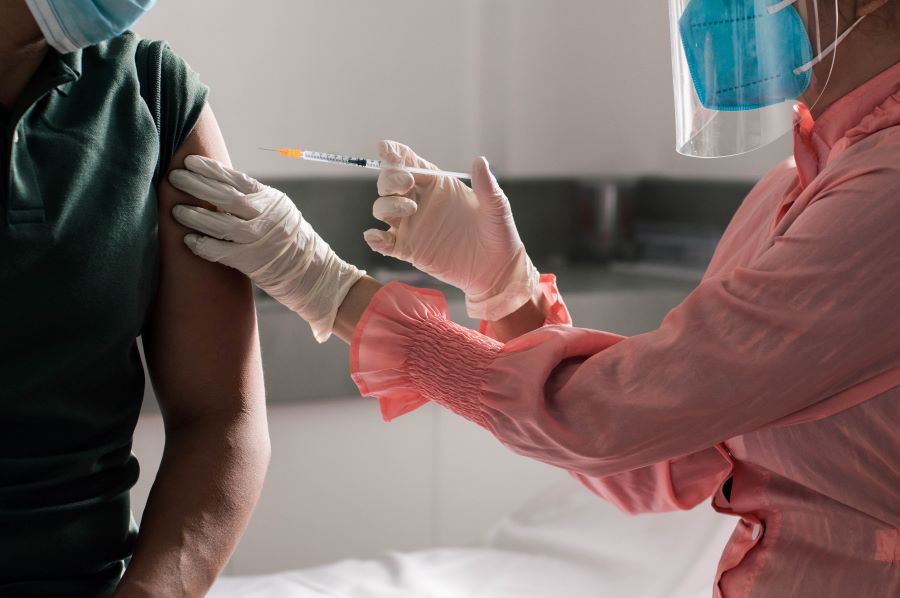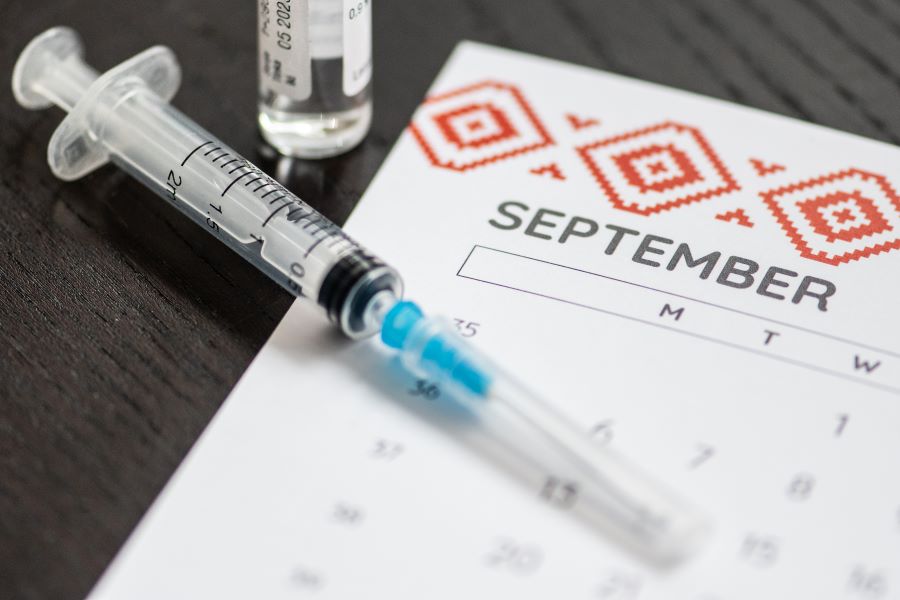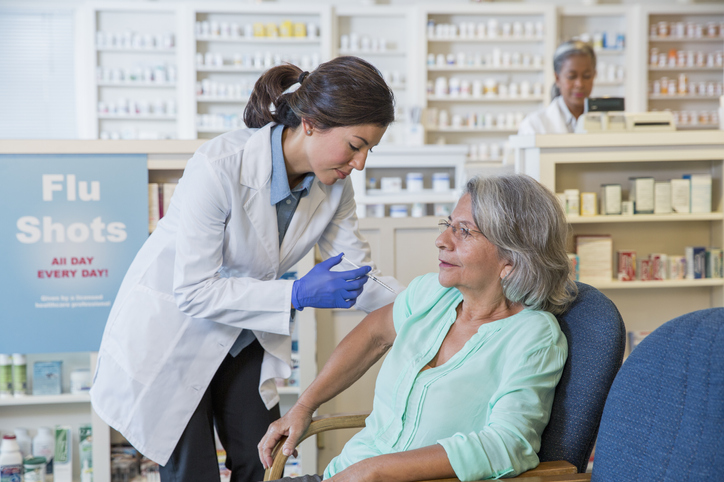Expert

Kara Amann
Actions
Type
Topic
- Disease Management
Tags
Fall and winter mark the respiratory virus season — a time in which influenza, COVID-19 and RSV all typically circulate at once and have the potential to significantly impact hospital operations. The CDC predicts this season will be similar to what was experienced last year, and the number of hospitalizations is expected to exceed what typically was experienced before the COVID-19 pandemic.
For the first time, vaccines are available for the three major respiratory viruses — flu, COVID-19 and RSV. These vaccinations have the potential to significantly reduce the burden of disease on hospitals this season. Health care providers are encouraged to talk with patients about staying up to date on vaccinations they are eligible to receive to protect both themselves and others around them, as well as to reduce the strain on the health care system. To assist hospitals, MHA developed this resource to provide information about these new and updated vaccinations.
Printable Fact Sheet
A printable fact sheet also is available.
Public Fact Sheet
A fact sheet for the public also is available.
General Information
“As a health care professional, your strong recommendation is a critical factor in whether your patients get an influenza [or other] vaccine. Most adults believe vaccines are important, but they need a reminder from you to get vaccinated. After making your recommendation, follow up with each patient during subsequent appointments to ensure they received an influenza [or other] vaccine. If a patient still is unvaccinated, repeat the recommendation and try to identify and address any questions or concerns.”
- There are programs to help uninsured and underinsured individuals get free vaccines, including the Bridge Access Program and the Vaccines for Children Program.
- The Bridge Access Program offers no-cost COVID-19 vaccines for adults who do not have insurance or whose insurance does not cover COVID-19 vaccine costs. Resources to promote the program are available.
- The Vaccines for Children Program provides vaccines — for COVID-19, flu, RSV and more — to children who otherwise might not be vaccinated because of inability to pay.
-
-
- For information on enrolling in the VFC program, visit the DHSS website.
-
-
Simultaneous Administration
- Providers may simultaneously administer COVID-19, flu and RSV vaccines to eligible patients. Simultaneous administration is defined as administering more than one vaccine on the same clinic day, at different anatomic sites, and not combined in the same syringe. The Health Alert Network published a Health Alert on Sept. 5, 2023, that offers additional information about simultaneous administration of these vaccines.
- Simultaneous administration of the COVID-19 vaccine and nirsevimab, a long-acting monoclonal antibody for certain infants and young children for prevention of RSV, is recommended.
Resources
Flu
- The CDC recommends the annual flu vaccination for everyone ages 6 months and older.
- Children ages 6 months to 8 years need two doses of the flu vaccine if it is their first time getting the vaccine, if they have only received one dose of the vaccine previously or if their flu vaccine history is unknown. The second dose should be given four weeks after the first.
- Adults over age 65 are recommended to get a higher dose or adjuvanted flu vaccine. Vaccination is important in this age group as they are at high risk for developing serious flu complications.
- Patients with certain chronic conditions, including asthma, heart disease, stroke, diabetes and kidney disease, are encouraged to get vaccinated as they are at a higher risk for developing severe flu complications.
- Because pregnant people are more likely to be hospitalized due to flu, which may be harmful to their developing baby, they are recommended to get the flu vaccine to protect themselves and their babies.
- Small changes for the 2023-24 season related to the recommendations for vaccination of people with egg allergies: All persons aged ≥6 months with an egg allergy should receive the influenza vaccine. Any influenza vaccine (egg- or nonegg-based) that is otherwise appropriate for the recipient’s age and health status can be used. Egg allergy alone necessitates no additional safety measures for influenza vaccination beyond those recommended for any recipient of any vaccine, regardless of the severity of previous reaction to egg. All vaccines should be administered in settings in which personnel and equipment needed for rapid recognition and treatment of acute hypersensitivity reactions are available.
Treatment
- Influenza antiviral prescription drugs can be used to treat influenza, and some can be used to prevent influenza. Currently, there are six approved for use in the U.S.
- Antivirals should be used as soon as possible after symptom onset for maximum benefit. They also are recommended for any patient with confirmed or suspected influenza who is hospitalized; has severe, complicated or progressive illness; or is at higher risk for influenza complications.
COVID-19
The following are recommendations for use of the 2023-24 formulations of Moderna COVID-19 Vaccine, Pfizer-BioNTech COVID-19 Vaccine and Novavax COVID-19 Vaccine. The updated monovalent vaccines are formulated to target the XBB.1.5 Omicron subvariant, which is closely related to the currently circulating variants and provides better protection than the previous bivalent formulation.
- Everyone ages 5 years and older is recommended to receive one dose of an updated COVID-19 vaccine. Individuals ages 12 and older can receive either an mRNA vaccine or the Novavax vaccine. If previously vaccinated, the dose should be administered at least two months after their last dose. If unvaccinated, one dose of an mRNA vaccine or two doses of the Novavax three weeks apart are recommended.
- Children ages 6 months to 4 years:
- Initial vaccination: should receive either two doses of updated Moderna or three doses of updated Pfizer-BioNTech COVID-19 vaccine
- Received previous mRNA doses: should receive one or two doses of updated Moderna or updated Pfizer-BioNTech COVID-19 vaccine, depending on the number of prior doses
- People who are moderately or severely immunocompromised:
- Initial vaccination: should receive a three-dose series of updated Moderna or updated Pfizer-BioNTech COVID-19 vaccine
- Received previous doses: need one or two doses of updated Moderna or updated Pfizer-BioNTech COVID-19 vaccine, depending on the number of prior doses, or an additional updated Novavax COVID-19 vaccine
- May receive one or more additional updated COVID-19 vaccine doses
- The Novavax vaccine uses a different, more traditionally used technology than mRNA vaccines. This is a protein-based vaccine and may be more accepted by patients not comfortable with receiving an mRNA vaccine.
- Pregnant people:
- Because pregnant and postpartum people are at increased risk for Long-COVID and severe illness, it is recommended and proven safe to stay up-to-date on COVID-19 vaccinations. Additionally, vaccination during pregnancy provides protection for newborns as it reduces the likelihood of COVID-19-related hospitalization and serious complications among infants ages 6 months and younger. “Expectant mothers should remain current with COVID-19 vaccination to protect themselves and their infants from hospitalization and severe outcomes associated with COVID-19.”
- The updated mRNA vaccines received full approval for individuals ages 12 and older and are authorized under emergency use for individuals ages 6 months through 11 years. The Novavax vaccine is authorized under emergency use.
- Reminder: Bivalent mRNA COVID-19 vaccines and the original monovalent Novavax COVID-19 vaccine no longer are authorized for use in the U.S.
- Several studies find that COVID-19 vaccines have a protective effect on developing long COVID and post-COVID conditions.
Treatment
- Outpatient
- Strong scientific evidence shows that antiviral treatment of outpatients who are at risk for severe COVID-19 reduces the risk of hospitalization and death.
- Antiviral drugs, nirmatrelvir with ritonavir (Paxlovid) and remdesivir (Veklury), are the preferred treatments for eligible adult and pediatric patients at high risk of severe COVID-19.
- Clinicians should consider treatment in patients with mild-to-moderate COVID-19 with one or more risk factors for severe COVID-19.
- Treatment should begin as soon as possible and within five days of symptom onset to be effective.
- Studies have found treatment with nirmatrelvir for infected patients with at least one risk factor for severe COVID-19 to be associated with a reduced risk for long COVID and post-COVID conditions.
- Inpatient
- The NIH recommends clinicians consider treating patients according to the risk of progression to severe COVID-19 or the severity of COVID-19. Recommendations for treatment depend on whether the patient is hospitalized for COVID-19 or for another reason and the level of oxygen support needed.
RSV
Immunizations for Pregnant People and Infants
- Pregnant people between 32 and 36 weeks gestation: The CDC recommends seasonal use of one dose of bivalent Pfizer RSV vaccine, RSVpreF, for pregnant people to protect the newborn from potentially severe RSV after birth. To maximize this protection, it is recommended that the dose be administered during weeks 32 through 36 of pregnancy. It is recommended from September through January. This vaccination was voted to be included in the Vaccines for Children Program for pregnant people under age 19.
-
- Providers are required to provide the vaccine information statement with the administration of this vaccine.
-
- Infants: The CDC recommends use of nirsevimab, a long-acting monoclonal antibody product, in infants under age 8 months and some infants age 8 to 19 months who are at high risk for severe RSV. It can be administered with other routine childhood vaccines.
- The American Academy of Pediatrics, American Academy of Family Physicians, and Centers for Disease Control and Prevention all have recommended the treatment, which has exhibited its potential to reduce the severity of RSV infections.
- Providers are required to provide the immunization information statement with the administration of nirsevimab.
- In response to limited availability of nirsevimab, the CDC issued a health advisory with interim recommendations for protecting infants during the 2023-24 respiratory virus season. The CDC recommends the following.
- Prioritize available nirsevimab 100 mg doses for infants at the highest risk for severe RSV disease, including infants under age 6 months and infants with underlying conditions.
- Recommendations for using 50 mg doses remain unchanged. Avoid using two 50 mg doses for infants weighing >5 kg to preserve supply for infants weighing <5 kg.
- Providers should suspend using nirsevimab in palivizumab-eligible children ages 8 to 19 months.
- Prenatal care providers should discuss potential nirsevimab supply concerns when counseling pregnant people about the RSVpreF vaccine. Maternal vaccination is effective and will reduce the number of infants requiring nirsevimab during the RSV season.
- Pharmacists can administer these immunizations but must have a prescription to do so.
- Most infants only will need the maternal RSV vaccine or infant immunization with nirsevimab. However, there are some cases in which infant immunization may be recommended after maternal immunization.
- Pregnant people should receive the vaccine during RSV season. Infants born outside of RSV season that are eligible for immunization should receive immunization as they enter their first RSV season.
Vaccine for Adults Age 60+
- The CDC recommends that adults ages 60 and older may receive a single dose of RSV vaccine using shared clinical decision-making. This means that health care providers and their patients should have a conversation to determine if RSV vaccination will be beneficial.
- The decision may be informed by a patient’s health status, their risk of severe RSV disease, the health care provider’s clinical judgment, the patient’s preferences, the safety profile of the RSV vaccine products and other factors. The SCDM recommendation for RSV vaccination is intended to allow providers and patients flexibility based on what is best for each individual patient.
- There are two RSV vaccines licensed for use in adults ages 60 and older in the U.S.: RSVPreF3 (Arexvy, GSK) and RSVpreF (Abrysvo, Pfizer).













